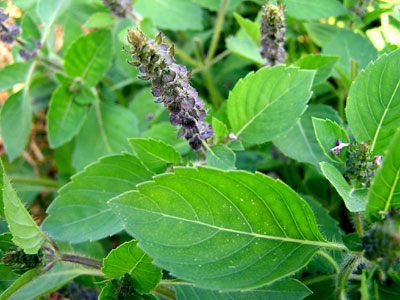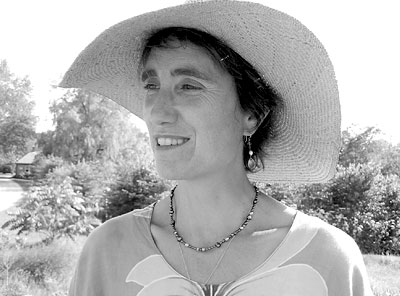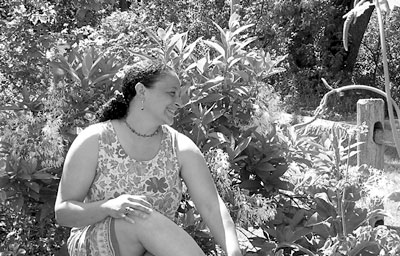 |
| Sacred basil is sacred in India and could well be sacred wherever it is grown. It has many medicinal qualities and makes a refreshing tea. English photo. |
By Deb Soule
Sacred basil or holy basil is native to India and is valued greatly for its medicinal properties and spiritual significance in Ayurvedic medicine and among people who worship the Hindu deities Lakshmi and Vishnu. The Sanskrit name for sacred basil is tulsi or tulasi. Tulsi is commonly grown in a special pot in many Indian homes, as one of the plant’s gifts is to offer divine protection for the home. Ayurvedic physician Vasant Lad says that next to the lotus, holy basil is perhaps the most sacred plant of India.
Sacred basil, Ocimum sanctum, grows easily from seed started inside in April and can be transplanted into northern New England gardens in early June, once the soil has warmed and the last frost date has passed. Some varieties have green leaves and some have a reddish color. Tulsi grows best in full sun and in soil that has been well amended with compost. Once the plants begin to set flower, harvest the flowering tops regularly to keep them bushy and producing more leaves and flowers. On a hot summer day, a bed of tulsi gives off a lovely, pungent aroma and is filled with dozens of buzzing honey bees.
Sacred basil makes one of my favorite summer teas. I keep a few pots on my deck to harvest for early morning tea. The pungent quality of the herb is easily imparted to a sun tea or heat infused tea. Place several flowering tops in a clear glass, quart jar and cover them with cool water. Sip the sun tea throughout the day. For a warm tea, place the fresh herb into a glass or enamel pot, cover it with water, and slowly heat the water until it’s close to simmering. Remove the pot from the heat and infuse the tea, covered, for 10 to 30 minutes.
Traditionally in India, tulsi has been used to treat colds and flus, because its pungent qualities are believed to purify and cleanse the respiratory tract of toxins. Taken as a tea, tincture or glycerite, it very effectively removes excess phlegm from the lungs and nasal passages. Adding tea made from fresh or dried leaves to a bath will enhance your recovery from a cold, flu or lung congestion.
Sacred basil is an excellent herb to use for acute or chronic digestive disturbances. It improves nutrient absorption and eases and releases the nervous stress that many people hold in their digestive tract. It is used to treat a variety of digestive disorders, such as heartburn, bloating, gas and ulcers. Tulsi reduces the adverse effects of drugs that irritate the stomach lining by helping to increase the production of protective stomach mucus.
Studies have shown that sacred basil has antioxidant properties, lowers cortisol levels and influences the neurochemistry of the brain in a manner similar to antidepressant medications. Regular use of this herb strengthens nerve tissue, promotes clarity of mind, increases memory and eases nervous tension.
Research conducted at Dartmouth Medical School confirmed that sacred basil contains phytonutrients that are strong COX-2 inhibitors. These phytonutrients contain anti-inflammatory and cancer-preventive qualities. The book Beyond Aspirin, by Thomas M. Newmark and Paul Schulick, notes that “the research on holy basil’s radioprotective properties is impressive. The term radioprotective describes the herb’s ability to protect the DNA of the body from the dangerous, mutating power of various forms of radiation. We are assaulted by the destabilizing influence of radiation in many ways and at many different levels of intensity. The daily effect of exposure to sunlight provides one type of radiation; at the other extreme is the profound assault that accompanies conventional radiation therapy. With every additional moment of excess exposure to the sun…and with every exposure to discrete bursts of higher intensity radiation from other sources, our cells absorb and store the cumulative destabilizing inflammatory effects. At a certain point, the DNA becomes so weary from absorbing the repeated blows, it just collapses.” A number of studies have shown how holy basil protects healthy cells from the toxicity of radiation and chemotherapy and helps limit the damage that radiation causes to the bone marrow and digestive tract.
Besides drinking sacred basil tea, you can add this herb to a soup with other immune enhancing herbs, such as shiitake, maitake and reishi mushrooms, and astragalus, codonopsis and burdock roots. This kind of medicinal soup can be taken by people who believe that their immune system needs to be strengthened or by people undergoing radiation and/or chemotherapy. (Be sure to consult with your health care providers.) When traveling, take a tincture or glycerite with you to help protect the immune system, to strengthen the digestive tract and to ease stress. Add a dropperful to your water bottle or tea every day. Beverage teas of holy basil are safe to drink during pregnancy, but avoid high therapeutic doses if you are pregnant.
Harvesting sacred basil is one of my favorite garden rituals, as the aroma of this plant awakens the senses, and its beauty deeply nourishes the spirit. The leaves and flowers can be made into a fresh tincture or glycerite soon after they are collected. Carefully chop the plant, place it in a clean glass jar and cover it with either 80 proof vodka or pure vegetable glycerine. Cap and let the mixture sit for four to six weeks, shaking or stirring it regularly. Strain the liquid through unbleached cheesecloth and enjoy the restorative qualities of this herb. For drying, gather the leaves and flowers and lay them on screens. Once they are dry, store them in a glass jar in a cool cupboard.
Dr. Vasant Lad says that sacred basil opens the heart and mind, bestowing the energy of love and devotion. Truly this plant is a gift to us in the Western world.
 |
| Deb Soule of Avena Botanicals. English photo. |
About the author: Deb is the founder of Avena Botanicals and the Avena Institute in West Rockport, Maine. She also wrote A Woman’s Book of Herbs. You can visit her Web site at www.avenaherbs.com. This article is for information only; please consult a health care practitioner if you have a serious medical problem.
Resources
Lad, Vasant and David Frawley, The Yoga Of Herbs
Newmark, Thomas M. and Paul Schulick, Beyond Aspirin: Nature’s Answer to Arthritis, Cancer and Alzheimer’s Disease
Simon, David and Deepak Chopra, The Chopra Center Herbal Handbook
Seed Sources
FEDCO Seeds, PO Box 520, Waterville ME 04903; www.fedcoseeds.com.
Horizon Herbs, PO Box 69, Williams OR 97544, (541) 846-6704; Fax: (541) 846-6233; www.horizonherbs.com
Johnny’s Selected Seeds, Winslow ME 04901; 877-564-6697; www.johnnyseeds.com
 |
| Stephanie Rae’s interests span everything from dancing to community health care. She is the first executive director of Avena Institute. John Sidik photo. |
Executive Director Helps Avena Institute Grow into a New Era
Stephanie Rae spent most of her career as a dancer, first in Boston, then New York, but she always used themes based on healing in her coreography. Now (and for the past year), the Reiki Master is coreographing Avena Institute in West Rockport, Maine, where she is executive director. The Institute is a nonprofit offshoot of Avena Botanicals, founded by herbalist Deb Soule.
